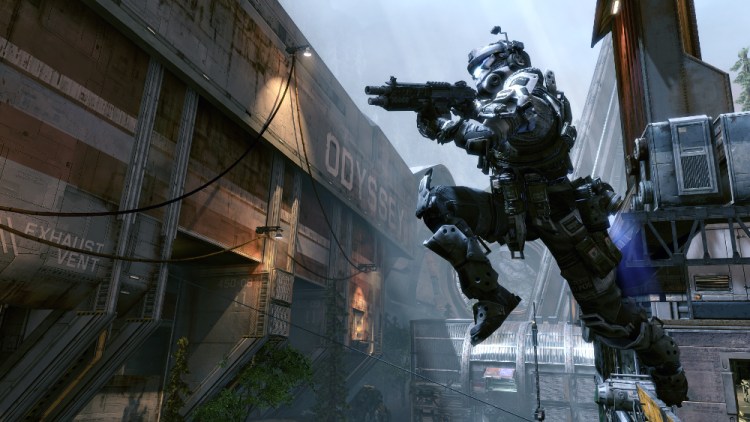Hardcore games like the downloadable first-person shooter sci-fi game Titanfall helped drive U.S. digital game sales in March up 9 percent to $936 million compared to a year ago.
Market researcher SuperData Research reported today that digital gaming grew across the board in March thanks to hits across multiple platforms. Blizzard Entertainment’s Hearthstone: Heroes of Warcraft card battler debuted on the iPad. The growth in the hardcore audiences on mobile, social, and online is a welcome development as casual leaders such as Zynga and King see slower growth.
Titanfall was mainly sold as a downloadable title for the PC and the Microsoft Xbox One console during March, with sales of an Xbox 360 version starting late in March. SuperData believes that title has done well as it has received high marks for innovation and because one in four U.S. gamers are regular purchasers of first-person shooter digital games. The digital PC and console category grew 2 percent from the previous month, but the category was up 21 percent from a year ago.
Normally, games like Titanfall would see their biggest launches via physical stores selling discs. But with the new generation of consoles, faster download speeds, the ability to download a game in the background while you are performing other tasks, and big hard drives that come with the machines are making hardcore digital downloads more practical. So the sales of hardcore games are split more evenly across digital and physical categories.
And hardcore titles are taking off on mobile, too. In test markets like Australia, Canada, and New Zealand, Hearthstone broke into the top-15 grossing ranks. Then it had a solid launch in the U.S. The game is helping to make the digital collectible card market into one of the hottest sectors in mobile games. About 12 percent of card game players are converting into paid users in free-to-play titles while the average revenue per player is $27 in the U.S. for card-battle games.
Then there’s the continuing popularity of free-to-play online games on the PC. Blizzard’s online free-to-play game Heroes of the Storm is also expected to take off, SuperData said, bringing new competition later this year to the $2 billion multiplayer online battle arena (MOBA) market that is dominated by Tencent/Riot Games’ League of Legends and Valve’s Dota 2.
“Zynga is starting to fall behind, struggling to monetize on par with the big boys,” said Joost van Dreunen, the chief executive of SuperData Research, in a statement. “Earlier, we observed an improvement in user spending as a result of the user shake-out on social gaming platforms. Consistent with this, we recorded another month-over-month increase in conversion, reaching 2.3 percent in March, up from 1.9 percent just six months ago.”
But he added, “Despite this market improvement, category leader Zynga has yet to show comparable results and reported a conversion rate of 1.7 percent in its most recent earnings reports. Efforts to stem the tide by focusing more aggressively on the highly-monetizing social-casino category has so far failed to deliver. Across its social casino titles, Zynga currently earns about 13 cents per daily active user, compared to the 17 cent minimum of its closest competitors in the space.”
King also had a poorly received initial public offering largely because of concerns about the slowdown in the company’s main franchise Candy Crush Saga. Revenues for Candy Crush Saga grew about 1.2 percent in March compared to the previous month while the mobile audience was nearly flat at 0.3 percent growth. That’s down from significant growth in the past year.
As far as physical disk sales go, Titanfall from Electronic Arts was the No. 1 title in March in the U.S., followed by Square Enix’s Thief, and Activision’s Call of Duty: Ghosts.
The top massively multiplayer online games on the PC were World of Warcraft, League of Legends, and Team Fortress 2. The top three social games were Candy Crush Saga, Double Down Casino Slots and Poker, and FarmVille 2. And the top mobile games were Clash of Clans and Candy Crush Saga.
VentureBeat's mission is to be a digital town square for technical decision-makers to gain knowledge about transformative enterprise technology and transact. Learn More





![Reblog this post [with Zemanta]](http://img.zemanta.com/reblog_e.png?x-id=bf6ea992-c4bb-44b1-9057-29ffd89bdcc4)
